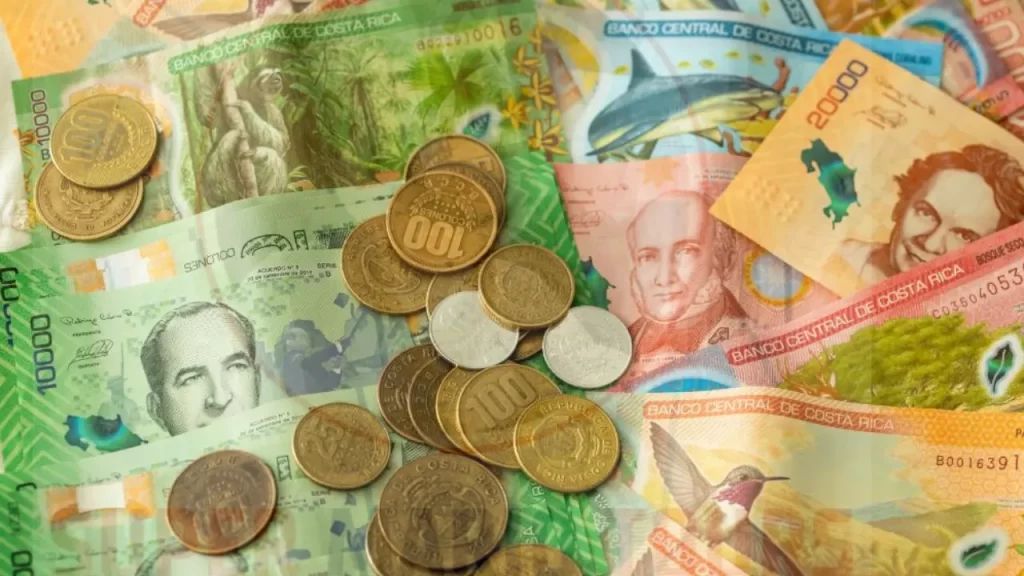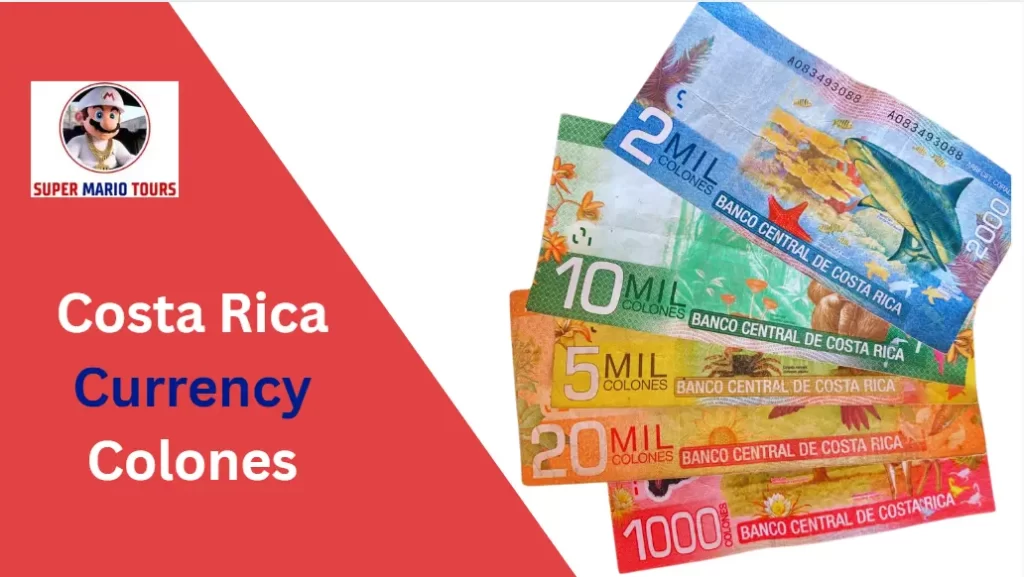Planning a trip to Costa Rica? Learn all about the colón (CRC), exchange tips, using US dollars, ATM access, tipping customs, and staying safe with money.
Everything You Need to Know About Costa Rican Colones (₡)
Understanding the Costa Rican Colón (₡)
The official currency of Costa Rica is the Costa Rican colón, abbreviated as CRC and symbolized as ₡. Named after explorer Christopher Columbus (Cristóbal Colón in Spanish), this currency has been in use since the 19th century.
What Currency Does Costa Rica Use?
Official Currency: Costa Rican Colón (₡)
The Costa Rican colón, named after Christopher Columbus (Cristóbal Colón in Spanish), is the official currency of Costa Rica. Its international code is CRC, and the symbol is ₡.
You’ll frequently see prices listed in colones (₡) at supermarkets, bus stations, local restaurants, and street markets. For example, a cup of coffee might be around ₡1,000 (~$1.50–$1.70 USD, depending on the exchange rate).
Helpful Tip: Learn more about Costa Rican currency history and economy from trusted sources like Lonely Planet’s Costa Rica Travel Guide.
Using USD in Costa Rica
The Costa Rican colón is the official money in Costa Rica.But U.S. dollars are also accepted in many tourist spots like Nicaragua, La Fortuna, La leona waterfall ,Tamarindo, and Miravalles volcano.
Still, it’s better to use colones when you can. You’ll get better prices and avoid paying more just because you’re using dollars.
Travel Insight: Major tourism websites like TripAdvisor also confirm that USD is commonly accepted in tourist towns of Costa Rica.
Pro Tip:
Even if you pay in USD, you’ll often receive your change in colones, so you’ll end up using the local currency anyway.
This is especially common at smaller shops, souvenir stands, or when taking a taxi. Since you’ll receive change in colones, it’s best to familiarize yourself with the bills and coins early in your trip.
Is USD Accepted in Costa Rica?
You can use U.S. dollars in many parts of Costa Rica, especially in areas that see a lot of tourists, like San José, La Fortuna, Tamarindo, and other beach towns. Hotels, tour companies, and larger restaurants often accept dollars without any issues.
That said, once you step into smaller towns or visit local spots—like roadside sodas (small eateries), markets, or mom-and-pop stores—it’s much better to pay in Costa Rican colones.
In these places, some businesses might not accept dollars at all, or if they do, they could offer an unfavorable exchange rate that leaves you paying more than you should.
How Much Cash Should I Bring to Costa Rica?
A good amount to bring is around $200–$300 USD in small bills like $20s or less. This cash can be used for tips, taxis, snacks, or small shops. You don’t need to carry all your spending money with you—ATMs are easy to find, and most big places take credit or debit cards.
If you plan to visit small towns or local places, it’s smart to have some colones with you too. Some spots won’t take dollars or cards.
Tip: Keep your cash in two safe places—some in your wallet for daily use and some hidden in your bag or hotel room, just in case.
Is Tipping Customary in Costa Rica?
Tipping Etiquette: How Much is Enough?
Costa Rica doesn’t have a strong tipping culture like the U.S., but tips are certainly appreciated. In fact, most restaurants automatically include a 10% service charge in the bill, which acts as the tip.
However, don’t rely solely on USD. In more rural towns and local eateries (“sodas”), businesses may not accept dollars—or may offer a poor exchange rate if they do.
Pro Tip:
Even if you pay in USD, you’ll often receive your change in colones, so you’ll end up using the local currency anyway.
What If You Run Out of Cash?
Don’t worry—Costa Rica has a good banking infrastructure. You can:
- Withdraw from an ATM
- Visit a local bank
- Ask your hotel to help direct you
Always keep emergency funds in a separate location (a sock, hidden pouch, or inside luggage).
Tipping Etiquette at a Glance
Foundation:
Service Area Typical Tip
| Service | Suggested Tip |
|---|---|
| Restaurants | 10% (check if included) |
| Tour Guides | $5–$10 USD per person |
| Taxi Drivers | Round up to the nearest amount |
| Bellboys/Porters | ₡500–₡1,000 per bag |
| Housekeeping | ₡1,000–₡2,000 per night |
Engagement:
Always check your restaurant bill for “Servicio Incluido”. If it’s already added, you’re not obligated to tip more, though it’s appreciated if the service was great.
Where Should You Tip?
- Restaurants & cafés
- Hotel staff
- Tour guides
- Baggage handlers
If you had a memorable tour or excellent service, a modest tip in colones can go a long way.
What’s the Exchange Rate?
As of 2025, the average exchange rate is:
1 USD ≈ 600–650 CRC
This rate fluctuates, so use currency apps like XE, Wise, or Google Currency Converter to check live rates.
Always check whether shops or tour operators are using a fair exchange rate—some will offer as low as ₡500 per $1 if you’re not paying attention.
Where to Get Colones in Costa Rica
ATMs
ATMs are widely available in cities, airports, and even small towns. Most accept international Visa and Mastercard debit/credit cards.
Pro Tips:
Choose CRC if given a choice at the ATM to avoid double conversion fees. Check with your bank in advance about foreign ATM fees.
Withdraw larger amounts to reduce per-transaction charges.
Currency Exchange Options
Banks – Reliable but may require a passport and have limited hours.
Casas de cambio (exchange offices) – More flexible, but rates vary.
Airport kiosks – Convenient, but often offer the worst rates.
What Do Costa Rican Colones Look Like?
Paper Bills
Costa Rican bills are some of the most colorful in the world and are made from polymer plastic, which is water-resistant, great for jungle adventures or beach days.
| Denomination | Color | Featured Animal | Notable Person |
|---|---|---|---|
| ₡1,000 | Red | Sloth | Braulio Carrillo |
| ₡2,000 | Blue | Bull Shark | Mauro Fernández |
| ₡5,000 | Yellow | Capuchin Monkey | Alfredo González |
| ₡10,000 | Green | Blue Morpho Butterfly | José Figueres Ferrer |
| ₡20,000 | Orange | Hummingbird | Carmen Lyra |
| ₡50,000 | Purple | Jaguar | Ricardo Jiménez Oreamuno |
Coins in Circulation
₡5, ₡10, ₡25, ₡50, ₡100, ₡500
Coins are commonly used for small purchases, bus fares, and local snacks.
Summary of Key Points
The Costa Rican colón (₡) is the official currency of Costa Rica, and while USD is commonly accepted in tourist-heavy areas, it’s always beneficial to use colones for more accurate pricing, particularly in rural areas.
Understanding the exchange rate (around 1 USD ≈ 600–650 CRC) and being aware of tipping etiquette, where a 10% service charge is standard in restaurants, can help you navigate daily transactions smoothly. Always keep a mix of colones and USD handy for convenience and savings.
FAQs
Where can I exchange money in Costa Rica?
You can exchange money at banks, money exchange offices (casas de cambio), or sometimes at hotels. Banks give good rates but might have long lines. Exchange offices are quicker but may offer lower rates.
TIP: Try not to exchange money at the airport—they often give the worst rate.
How much cash should I bring to Costa Rica for a week?
Bring around $300–$500 in cash for a week. It depends on how much you plan to spend. Like if you are going for 7 day itinerary then it requires more to bring. Cash is useful for tips, small shops, buses, and local places that don’t take cards.
What is the best currency to use in Costa Rica?
The best currency to use is the Costa Rican colón (₡). It gives you better prices, especially in local markets and small towns. U.S. dollars are fine in tourist areas, but locals prefer colones.
Can I Use Canadian Dollars or Euros in Costa Rica?
Canadian dollars and Euros are not widely accepted in Costa Rica. Most places only take Costa Rican colones or U.S. dollars. You will have to exchange it if your bring canadian dollars.
Can I use my debit card in Costa Rica?
Yes, debit cards work at most ATMs, hotels, and large stores. Just tell your bank before your trip so your card doesn’t get blocked. Also, check for any extra fees your bank may charge when using it abroad.
Can you use USD in Costa Rica?
Yes, you can use U.S. dollars in many tourist places, like hotels and restaurants. But some local spots may not take dollars—or may give a bad exchange rate. It’s smart to carry some colones too, just in case.


